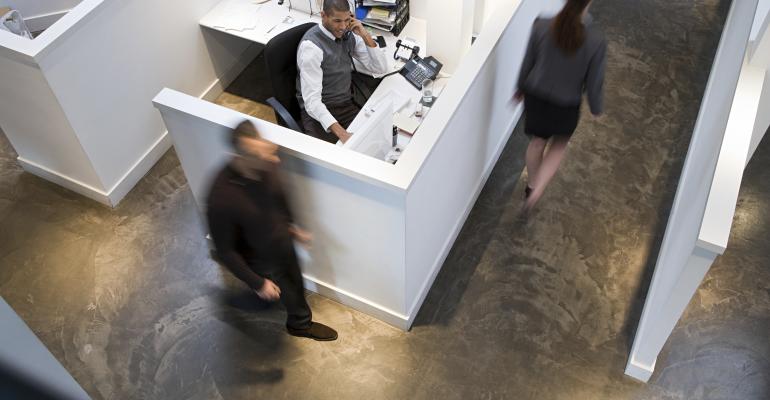The co-working trend is here to stay. Emerging out of the recession, as businesses downsized and out-of-work professionals launched new enterprises, shared workspaces are the perfect fit for small businesses and wildly popular among entrepreneurs. It’s flexible, serviced office space, often with loads of amenities and—best of all—offers a collaborative environment that inspires creativity and innovation, notes JLL National Research Director Julia Georgules, author of a JLL report on Shared Workspaces.
The innovative environment inherent in co-working spaces is one reason many larger companies now place creative staff in co-working spaces across the nation. Co-working also provides large companies with a plug-and-play way to expand into new markets, Georgules says. “The idea is attractive for employers, small business and entrepreneurs—you can show up, share a space and plug in.”
While shared office space represents only a tiny share of total office stock in the country at 0.7 percent, its growth is on the fast track and now encompasses 27 million sq. ft., according to the JLL report, which notes that the two top operators in the sector are Regus, with nearly 1,000 locations and WeWork, with 100 locations. Rapid growth in the co-working sector also reflects a Millennial-driven shift in how and where people work, offering a variety of workplace options—table, desk, private office, lounge, café and outdoors spaces —and amenities that turn workplaces into fun places, Georgules says.
Growth in shared workspaces is expected to continue over the next two to three years until the current cycle slows. While its sustainability through a downturn is unknown, Georgules believes the co-working concept is resilient. She points out that while some businesses may exit the marketplace, downsizing firms that currently use traditional office space may replace them.
Brand, size and location are the most important ingredients for successful co-working spaces. The exception is spaces that cater to specific industries, like RockSpace, the top co-working tech accelerator for start-ups, which provides a global tech-corporate ecosystem of locations in San Francisco, London, Beijing and soon Australia.
One of the most popular branded co-working operations in the world, WeWork, has grown from 20 locations six years ago to 125 locations across 10 countries today. The company is currently in hyper-growth mode, according to Jon Slavet, WeWork West Coast general manager.
“WeWork has so much demand, locations are sometimes sold out before they open,” Georgules says, noting that the spaces offer members networking opportunities with like-minded peers locally and globally, social and professional events, expert mentors, lots of amenities, conference spaces, access to WeWork locations around the world, discounts on health club access, as well as payroll and other services.
WeWork’s new B Street location in downtown San Diego is “one of our best locations and is adding 70 to 100 members monthly,” according to Slavet. This WeWork location is the largest in the Southern California region, with 90,0000 sq. ft. on three floors of an office tower, providing a member capacity of 1,700, compared to 300 - to 500-member capacity at other regional locations.
The San Diego location is unique in that it has a 7,000-sq.-ft. outdoor rooftop lounge-workspace. It offers a mix of private offices with the flexibility to expand to accommodate up to 100 people for members willing to commit for two to three years.
Regus is also a well-known branded co-working operator with a nice package of services, according to Georgules, including the ability to work out of any of its locations worldwide, payroll and virtual office capabilities, as well as private offices and open, collaborative spaces.
Evolving from an executive suites operator to a provider of co-working space, Regus doubled its locations from 2013 to 2015 and now occupies upwards of 20 million sq. ft. around the world. As WeWork’s closest competitor, Regus acquired Spaces, a popular European co-working brand founded in the Netherlands, with locations in Amsterdam, Rotterdam, London, New York, Melbourne and Sydney. Regus is now opening Spaces locations in U.S. cities, including the Silicon Valley, San Francisco and Dallas in 2016, and in Santa Monica and Los Angeles in 2017. Plans are underway for another location in Austin, notes Georgules.
While the cost of co-working space at WeWork and Regus properties may make sense on a per person basis, it comes at a premium compared to traditional office space. The JLL report notes that a sampling of shared office pricing across major U.S. markets revealed a per sq. ft. price of $139, compared to an average class-A CBD rental rate of $49.59—a 181 percent premium. When looking at average rental rates for all regular office space, that premium jumps to 331 percent.
While these numbers are startling, high-cost co-working spaces do provide some perks that are hard to quantify, including flexibility. For start-ups, this flexibility provides a degree of agility and faster speed-to-market should their next round of venture capital come through, the report suggests, noting that it also gives these companies room to grow at their own pace, adding two, three or 10 employees, as needed.
In addition, many innovative ideas are generated as a result of collaboration by creative professionals working out of co-working spaces. Slavet says that 50 percent to 60 percent of WeWork members end up working together on joint projects.
For businesses seeking shared space on a shoe-string budget, Georgules notes that operators like Liquid Space and Pivot Desk provide space at a discount. These operators basically fill excess office space offered by firms that have downsized, but are committed to long-term leases.

